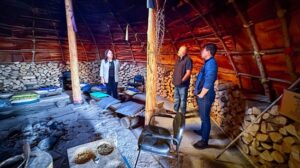Carleton University to launch new Certificate in Journalism in Indigenous Communities program

By Rick Garrick
OTTAWA — Carleton University’s School of Journalism and Communication is planning to launch a new 10-month Certificate in Journalism in Indigenous Communities (CJIIC) program featuring in-person and virtual instruction for Indigenous students in 2025.
“We know that there is a lot of work out there for Indigenous journalists, we know that our communities need more responsive journalism and unfortunately, there aren’t enough young Indigenous people coming up into the industry to fill the positions that are out there,” says Duncan McCue, professor at Carleton University’s School of Journalism and Communication and Chippewas of Georgina Island citizen. “I’ve been teaching journalism for 15 years and every journalism school I’ve been to has only had a very small number of Indigenous students. At Carleton right now, we only have three or four Indigenous students out of a student body of 300 or 400.”
McCue says they are setting up the CJIIC program to try to reach Indigenous students in a way that will help them in their education and get them started in journalism, noting that they have two Indigenous institute partners, Kenjgewin Teg on Manitoulin Island and First Nations Technical Institute on Tyendinaga Mohawk Territory.
“We know that there are barriers to our young people getting into education and journalism education in particular,” McCue says. “Those barriers are financial and they’re often cultural — they don’t want to leave their home communities for all kinds of different reasons and that’s totally understandable, but all the journalism schools in Ontario are based in big cities.”
McCue says the CJIIC program will introduce the students to basic journalism skills.
“All of our instructors are going to be Indigenous journalists,” McCue says. “We’ll have eight different courses and they’ll all be taught by Indigenous journalists, so they’ll get to know their instructors as well. We really want to make sure that these journalism courses are designed with Indigenous world views so we’ll have a cultural advisor who will be an important part of the program and designing our courses as well.”
The CJIIC program includes online courses for the students to study journalism from their home communities and three in-person intensives, with the first scheduled in September 2025 at Kenjgewin Teg, the second yet to be determined during the winter term,0 and the third in May 2026 at Carleton University in Ottawa.
“We’re making sure that we have in-person intensives where the students will get to know each other and get a chance to do hands-on learning with the equipment,” McCue says. “We will be able to offer them introductory skills and if they decide after one year that they’ve got as much as they need to do what they want in their home communities, whether it’s run a radio station or set up a podcast or work on the band newsletter or whatever, then they’ll be able to do that but if they decide they want to continue on in studying journalism they’ll be able to go straight into second year at Carleton.”
McCue says the CJIIC graduates would also be able to continue their studies in the second year of Carleton University’s online Bachelor of Arts General Studies degree.
“So they’d be able to stay in their home communities and get a BA after they complete the one-year [CJIIC],” McCue says.
McCue says the tuition for the CJIIC program will be the same as the first year of Carleton University’s journalism program.
“But if they successfully complete the program, we’ve got financial incentives for them like $3,000 awards,” McCue says. “And we’re also making sure they have all the technology that they need to complete the program. So thanks to a donation from the Mastercard Foundation, we’re really trying to make sure that we get as many young people into the field of journalism as possible.”
McCue says the CJIIC program will also have a two-week internship at a news or media organization.
“We’re going to find them some real-life learning experience and we’re going to make sure everything is paid for when they do that [internship],” McCue says.
Information about the CJIIC program is posted online.

